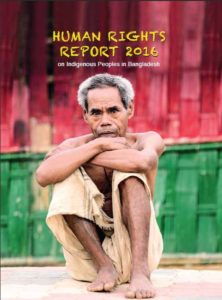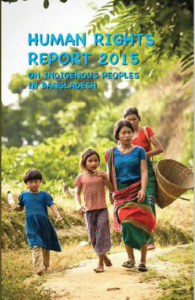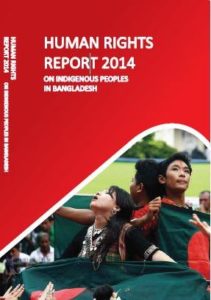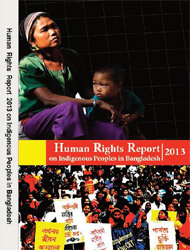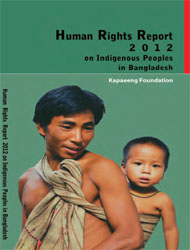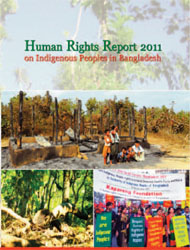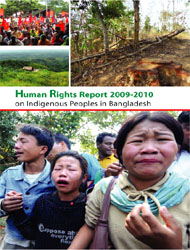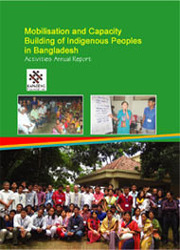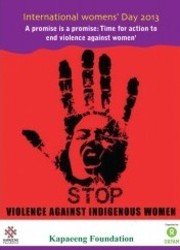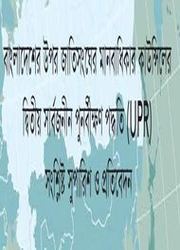An indigenous youth killed and six persons including two women injured, 6,500 villagers live in fear of eviction and academic life of 16,000 students of 228 pry schools on the verge of closing down
In July 2015, an indigenous youth was killed and six indigenous persons including two women were injured in different incidents in different districts in Bangladesh. In Kaptai under Rangamati district, 32-year old indigenous villager was shot dead by forest guards and another indigenous youth sustained bullet injuries in this attack. Due to land-related dispute, a 35 year old Munda woman was physically attacked by nighbour Muslim villagers in Shyamnagar under Satkhira district. In Netrakona district, three indigenous villagers including a woman was injured in an attack by a group of Bengali Muslims. Another indigenous person was critically injured in an attack by nighbours in Mymensingh district.
Land grabbing and eviction of indigenous peoples from their ancestral land is continuing. Around 6,000 tea indigenous workers are under threat of eviction from their ancestral land as government plans to establish special economic zone on their land at Chandpur Tea Garden area of Chunarughat upazila under Habiganj district. Around 100 families of five indigenous villages in Lama upazila under Bandarban district are now living in fear of eviction from their ancestral homes as land grabbers in the name of setting up rubber plantation there have been threatening them with consequences.
The academic life of about 16,000 students of 228 primary schools of the Chittagong Hill Tracts area hangs in the balance as the schools are on the verge of closing down. The students, guardians and teachers of the schools are living out their days in a state of anxiety as donor agencies have stopped funding the schools since June and the government is yet to take any full decision on nationalisation of the schools.
Please find detailed reports of these incidents:
An indigenous youth shot dead and another one injured by forest guard in Kaptai
On 8 July 2015, around 9:30 am an innocent indigenous youth named Raj Kumar Chakma (32) son of Krishna Moni Chakma was shot dead by the forest guard of Ghuttyabon Arachori forest office under Kaptai upazila Ranagmati district. In this armed attack, another indigenous villager named Mong Thui Marma (35) son of late Thui Aung Prue Marma was injured critically. No case was filed in this regard.
It is learnt that on that day Raj Kumar Chakma and Mong Thui Marma went to jungle to collect firewood while a group of forest guards led by Nirmal Kumar Kundu, beat officer of Kaptai forest department were patrolling the area. At that time, forest guards fired targeting them. Afterwards, Raj Kumar Chakma was spot dead and Mong Thui Marma was injured.
It is also reported that in a local arbitration, a compromise was made between the victim families and the forest department with a compensation amounting taka 200,000 for the family of deceased and taka 50,00 for the family of injured person. However, only taka 100,000 was received by the family of deceased so far.
It is worth mentioning that several unlawful killings, missing were committed allegedly for long time by forest department staff in this area. But they are not receiving any justice legally against such these incidents. Unhindered human right is contravening by killing indigenous people in these areas by forest department staff. Two remarkable occurrences of killing by forest guard can be mentioned here. On 7 April 2012 an indigenous adolescent named Ula Mong Marma (14) son of Thui Mra Chai Marma of village- Aga Para of Chitmorom union under Kaptai upazila of Rangamati district was allegedly killed by hitting on the head by forest guards of Karnophuli forest range of forest department and on 19 October 2012 an innocent indigenous Jum farmer named Priya Lal Tanchangya (35) was shot dead by forest guards.
Indigenous Munda woman physically harassed in Satkhira
On 8 July 2015, around 11:00 am, a group of land grabbers suddenly attacked a 35 year old Munda woman based on the conflict arises from residential land argument and goat trans passing to the neighborhood houses at Jelekhali Munda Para in Shyamnagar upzila under Shatkhira district.
The Munda woman was beaten brutally based on the issue of goat transpass in neighborhood while she was alone in her house. As the victim has described, Md. Alamgir Kagji (22), Tanjila Khatun (20), Nur Islam Kagji (45) suddenly came into the house and beaten the Munda woman with hands, later they started to beat her randomly by knob stick and she seriously got injured to hospitalized soon after she was rescued by the locals. After the incident the husband to the woman lodged a case in Shyamnagar police station against the people mentioned above on 23 July 2015, the case file number is 207.
The follow up to the case says, though they are found guilty and been ordered to arrest the perpetrators soon, yet with the support of the administration none is arrested. In the mean time the local civil society has arranged a settlement between the victim and the perpetrators, where it was settled that the victim will receive 15,000 taka from the perpetrators in return of withdrawal to the case. Again, there are alleges that soon after the settlement the perpetrators again started to thrive the family and other Munda people around that area.
According to the sources, this is not the first time that these people are harassing and beating around the people in the Munda Para. In before 3 families has suffered on a same way by the alleged perpetrators. Though they found to be guilty for threatening and beating the Munda people in a same way, but they get rid of all alleges with the support of either the local members of Union Parishad or the administration.
Attack on Garo villagers in Netrokona
On 18 July 2015 around 8:00 pm a group of Bengali Muslims led by Golap Mian attacked on Mongarha Garo village under Kalmakanda upazila in Netrakona district. In this attack, Alok Hajong, Sanuya Thigidi and his wife Tapashi Nongmeen were critically injured.
In is learnt that on that day at night Golap Mian entered to the Mongarha Garo village without permission of Garo villagers and hence an altercation took place while indigenous Garo villagers opposed him. Following this altercation, Golap Mian along with around 50 persons attacked said indigenous village.
An indigenous youth injured in an attack by a neighbour in Mymensigha
On 29 July 2015 an indigenous person name Liton Chandra Barman (27) son of Jiten Barman was beaten by Delowar Hossain (40) and his group at Tamat village under Kachina union in Mymensingh district. The victim admitted at Sakhipur Upazila Hospital later the victim was sent to Bhaluka Upazila Hospital.
According to the Liton Chandra Barman’s family it’s been learnt that, Wednesday on the incident day Mr. Liton Chandra Barman was discussing with Mr. Delowar Hossain about not engaging in violent activity. In this they had altercation each other. At a time Mr. Delowar Hossain got angry and attacked Mr. Liton Chandra in Adivasi Polli (indigenous village) in the night. In this attack, Mr. Liton Chandra got injured and the local people took him to the nearest hospital. Sources said that, On Thursday 30 July 2015 Mr. Delowar Hossain again threatened Mr. Liton Chandra Barman to leave the country.
6,000 tea workers face eviction threat due to establishment of a special economic zone in Habiganj
Recently the government of Bangladesh undertook plan to acquire 500 acres of land belonging to tea workers for establishment of Bangladesh Economic Zones in Chunarughat upazila under Habiganj district. Around 6,000 tea workers belong to indigenous Santal community have been living on this land for generations. They will be uprooted from their ancestral land if the government plan is implemented.
Tea workers alleged that they get only Taka 69 (US$ 0.80) per day for their job. Even after that, they have been living happily because they have land to cultivate and reside in. But, as president of Chandpur Tea Garden Panchayet Committee Sadhan Santal said, there is a conspiracy to grab their ancestral land in the name of building a special economic zone.
It is worth mentioning that around 6,000 Santals are dependent on 500 acres of land of Chunarughat upazila for living and cultivation. Among them, around 1,100 Santals work at the Chandpur Tea Garden. The Santal labourers claimed that their predecessors made the land cutting hills and forests 150-200 years ago. There is a graveyard of their forefathers. They cannot give away their ancestral land.
In a discussion on “Human Rights of Tea Garden Workers and Their Socio-Economic Development” jointly organised by Indigenous Social Development Organisation and Tea Garden Workers on 2 August 2015 at National Press Club in Dhaka, the workers of Chandpur Tea Garden in Habiganj threatened that they would rather die than give up their ancestral land chosen for setting up a special economic zone. (This report has been prepared based on information collected through Kapaeeng’s networks and news of The Daily Star titled ‘Tea workers won’t give ancestral land’ published on 3 August 2015.)
100 families live in fear of eviction in Lama, a village head arrested
Around 100 families of five indigenous villages in Lama upazila under Bandarban district are now living in fear of eviction from their ancestral homes as land grabbers in the name of setting up rubber plantation there have been threatening them with consequences. The families of five villages are 30 families of Ruposhi Puraton Marma Para, 30 families of Ching Kung Mro Para, 25 families of Konau Mro Para, 15 families of Noa Marma Para, and 15 families of Ching Khung Marma Para under Lama upazila.
The indigenous villagers alleged that the local administration was helping the land grabbers to occupy their land. In January 2015, the influential land grabbers compelled four indigenous families of around 25 members at Konau Mro Para in Longkyong mouza to leave their homes. It is learnt that the victims took shelter in remote Sangu reserve forest and Alikadam upazila of the district. Gazi Rubber Plantation, a business concern of Gazi group, was behind everything.
The indigenous villagers claimed that hired gangsters had destroyed their Jum cropland and vandalised Jum farm houses when they refused to bow to the threats and pressure from the land grabbers. It is alleged that Gazi Rubber Plantation has illegally purchased around 700 acres of land in Lama upazila with the help of upazila administration. They grabbed more than 2,000 acres of land of the indigenous people in the upazila.
On 29 May 2015, a scuffle between the locals and the workers of Gazi Rubber Plantation broke out when the indigenous people protested the land grabbing. Following the incident, the company filed a false case with Lama police station, and Koy Hla Ching Marma, a karbari (a village chief of indigenous peoples) of Ruposhi Puraton Para under Puposhi union in Lama upazila, was arrested on 30 May 2015.
The indigenous people mostly depend on Jum cultivation and forest resources for their livelihood. The villagers submitted a written complaint against the land grabbers to the upazila administration on 12 May 2015. Even they approached Bandarban Deputy Commissioner several times in this connection. But the local administration did not take any action in this regard.
Since the 1997 signing of the Chittagong Hill Tracts Accord, thousands of acres of indigenous land mainly in Lama, Naikkhyongchari, and Alikadam upazilas under Bandarban district have been grabbed by influential private rubber plantation owners and horticulturists with the alleged involvement of district and upazila administration. (This report has been prepared based on information collected through Kapaeeng’s networks and news of The Daily Star titled ‘100 families face eviction threat’ published on 27 June 2015).
Mayor of Khagrachhari municipality tries to occupy land of Buddhist temple in Khagrachari
Mayor of Khagrachhari municipality is trying to grab land beside the Triratna Buddhist temple, next to the town’s Agriculture Research Institute in Khagrachari municipality under Khagrachari district.
According to the temple committee, in the years since the land was donated, the Roads and Highways Department has built shanty houses on part of the land and the mayor planted trees on some of the area in dispute. The temple in question was built on donated land over 20 years ago and is registered by Bangladesh Buddhist Welfare Trust as an entity with the Ministry of Religious Affairs (Source: Openly investigate land disputes involving minority communities, Dhaka Tribune, 3 August 2015).
228 CHT pry schools in limbo as donor funding ends
The academic life of about 16,000 students of 228 primary schools of the Chittagong Hill Tracts area hangs in the balance as the schools are on the verge of closing down. The students, guardians and teachers of the schools are living out their days in a state of anxiety as donor agencies have stopped funding the schools since June and the government is yet to take any full decision on nationalisation of the schools.
The nationalisation has become uncertain because of problems in land registration, said primary and mass education ministry officials. If these schools are forced to shut down, children will have to travel for up to three days to attend the nearest government primary schools, or most likely, not attend schools at all. This would be a serious setback to the progress in education among communities living in remote areas, said field-level education officials and academics demanding the nationalisation of the schools, treating them as special cases, as land registration in hill areas is difficult. At present, many teachers and students are not going to school or have become irregular.
There are about 1,000 teachers at the 228 schools – 86 are at Rangamati, 83 in Bandarban and 59 in Khagrachhari. There are a total 1,561 primary schools in the three hill districts, Rangamati in 600, 621 in Khagrachari and 340 at Bandarban, confirmed officials. There is huge difference between the plain-lands and hill areas as the latter still has a high rate of illiteracy and dropout. If these schools are closed many of the students will drop out, said an official of Rangamati district primary education office.
These non-government schools, in some of the remotest parts of CHT region, were set up by locals at different times and international development partners started funding the schools through the UNDP’s Support to Basic Education in CHT project, under its Chittagong Hill Tracts Development Facility project. These schools are managed by the Hill District Councils and funds are channeled through the CHTDF. ‘The project was scheduled to be closed in 2015.
The primary and mass education ministry has some criteria for schools to be nationalised.
For the third phase of nationalisation, schools need to have 30 decimals of land either registered or leased before May 24, 2012. Because of a long and complicated land registration process in the Chittagong Hill Tracts, the 228 schools could not complete land registration by the deadline. (Source: 228 CHT pry schools in limbo as donor funding ends, The New Age, 26 July 2015; Kalerkantho 12 July 2015; and Manabkantho, 8 July 2015).



